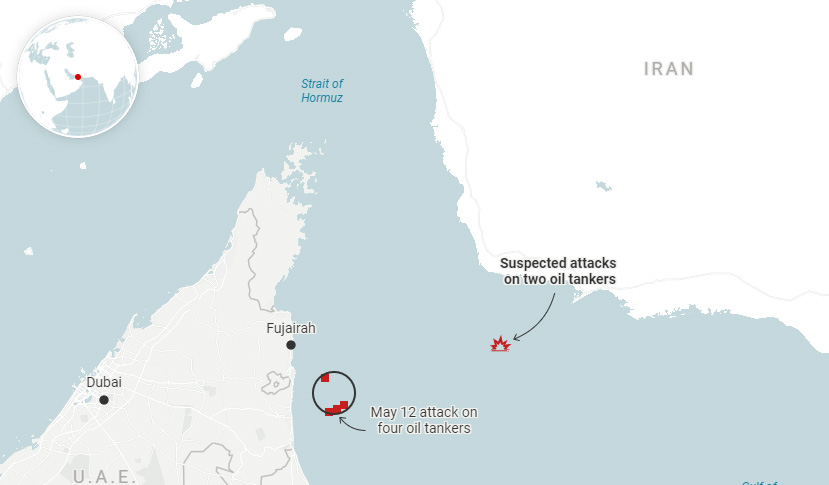A U.S.-China trade war and mysterious oil-tanker saboteurs on the other side of the world could have major impacts on the price of gas in Canada this summer, for better and for worse.

Investors are afraid of what might happen in the trade war and that’s dragging the price of fuel down worldwide, according to Dan McTeague, an industry expert with GasBuddy.com. Meanwhile, investors are also reacting to a string of attacks on oil tankers in a busy Middle East shipping lane used to move one-fifth of the world’s oil supply.
“The market is absolutely panicked,” McTeague told Global News on Thursday. “If it were not for the trade dispute, we would be looking at near record-high prices for the current year across Canada and North America, and around the world.”
McTeague says global oil supplies are already tightening, and they could be pushed to the brink if more tankers are attacked and the trade war suddenly ends. That would cause the price of fuel to skyrocket amid a supply shortage, meaning Canadians would suddenly face much higher prices at the pumps.
“The price would snap back violently,” McTeague said. “That could really cause a lot of problems for consumers.”
The latest tanker attacks happened Thursday, when two vessels were disabled in the Gulf of Oman. The incident caused crude prices to jump four per cent.
“The knee-jerk reaction is more a response to the risks associated with higher tensions in the region and prospect of more attacks than immediate impact on oil supplies,” Craig Erlam of OANDA said in a market commentary.
The attacks happened near the entrance to the Strait of Hormuz, a critical shipping lane for several major Middle Eastern producers, including No. 1 producer Saudi Arabia. The U.S. responded by dispatching its powerful Fifth Fleet to the area, stoking concern about a potential conflict with nearby Iran.
“We need to remember that some 30 per cent of the world’s (seaborne) crude oil passes through the straits,” Paolo d’Amico, chairman of the INTERTANKO tanker association, told Reuters on Thursday.
“If the waters are becoming unsafe, the supply to the entire Western world could be at risk.”
The U.S. and Saudi Arabia blamed Iran for attacks on four other tankers in May, following a complicated operation that disabled the vessels using underwater limpet mines. Iran has denied any involvement in the attacks.
One of the attacks on Thursday appeared to have involved a small explosive like a limpet mine, according to Jakob P. Larsen, head of maritime security for the shipowners association BIMCO.
“The shipping industry views this as an escalation of the situation, and we are just about as close to conflict without there being an actual armed conflict (as possible),” Larsen told The Associated Press. “Tensions are very high,” he added.
Crew on one of the tankers abandoned ship after spotting what they suspected was a limpet mine on the hull, a U.S. source told Reuters.
U.S. Secretary Mike Pompeo blamed Iran for the attacks on Thursday afternoon.
WATCH: UAE says ‘state actor’ was behind attacks on four oil tankers

Iran previously used mines against oil tankers in 1987 and 1988 in the so-called Tanker War, which saw the U.S. navy escort ships through the region.
No one has claimed responsibility for the latest round of tanker attacks.
WATCH: UN chief condemns tanker attacks

Iran appears poised to break the 2015 nuclear deal that U.S. President Donald Trump withdrew from last year. The Trump administration has hammered Iran with sanctions ever since, cutting off trade opportunities for many of its exports, including oil.
Iran is giving Europe until July 7 to find new terms for the nuclear deal, or it will resume enriching uranium to the point where it could potentially make nuclear weapons.
—With files from Reuters and The Associated Press
- Cruise ship arrives in New York with dead endangered whale stuck on bow
- Boeing 737 whistleblower says he found 100s of defects on plane parts every day
- Ukraine’s Zelenskyy fires state guard head after 2 accused in assassination plot
- Israel due to get billions of dollars of U.S. weapons despite pause on bombs






Comments